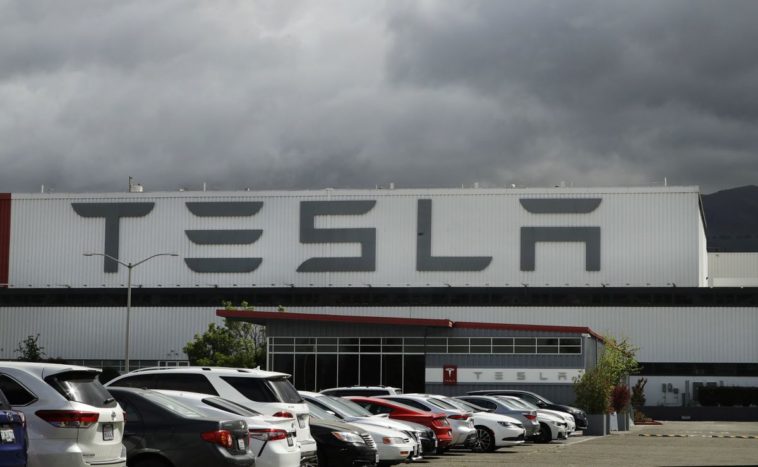The ‘absurdly wide’ valuation spread between value and growth stocks holds lots of opportunity
/cloudfront-us-east-1.images.arcpublishing.com/tgam/UXRP4YG3U5PHVDMU2HACUCAOSY.jpg)
Shares of Tesla Inc. have rocketed ahead more than 800 per cent over the past 12 months. Tesla’s plant in Fremont, Calif., is shown here on May 12, 2020.
Ben Margot/The Associated Press
Smart investors should start betting against a bubble in growth stocks, according to a widely followed money management group.
To further that goal, GMO LLC, the Boston-based investment company founded by famed contrarian Jeremy Grantham, has launched a fund that aims to short, or sell, overvalued stocks around the world while simultaneously loading up on their cheaper counterparts.
The aim of the company’s new Equity Dislocation Strategy is to take advantage of what GMO calls an “absurdly wide” spread in valuation between value stocks and growth stocks.
“No matter where you look, no matter how you slice it, value looks cheap,” Ben Inker, the company’s head of asset allocation, declared in a quarterly letter published Tuesday.
While the new fund is aimed at deep-pocketed institutional investors, Canadian households may want to pay attention to the thinking behind it, given GMO’s track record of spotting market bubbles before they pop. The money manager was well ahead of its peers in warning of the dot-com frenzy of the 1990s and the U.S. housing mania of the early 2000s.
According to Mr. Inker and his colleague John Pease, today’s investors have once again become detached from reality with “more crazy activity in the stock market than anything we have seen since 2000.”
Consider, for instance, the comedy that followed a declaration of bankruptcy by Hertz Global Holdings Inc. Hertz Global Holdings Inc. in May. A couple of weeks later, the car rental company’s stock price soared nearly tenfold, apparently propelled by small-time speculators who didn’t realize bankruptcy meant the stock was nearly certainly worthless.
Or ponder how Eastman Kodak Co.’s Eastman Kodak Co.’s stock shot up more than 20-fold in July on a vague announcement that it was going to start making chemicals to enable the production of COVID-19 treatments. The stock soon faded as it became clear the news meant little.
Some of the biggest outbursts of exuberance have focused on makers of electric vehicles. Tesla Inc., Tesla Inc., for instance, has rocketed ahead more than 800 per cent over the past 12 months.
As the GMO duo note, the stock market now values the upstart automaker as being worth more than “all the other U.S. automakers, all the European automakers, and all the Korean automakers, with Honda, Mazda, and Nissan thrown in for good measure” – never mind that those other automakers cumulatively made about 100 times more cars than Tesla did in 2019.
Just as remarkably, a startup electric-truck maker called Nikola Corp. Nikola Corp. went public this year via a reverse merger and rose to a market valuation of about US$30-billion – despite never having produced a vehicle. Its founder resigned after a short-seller’s report raised questions about his past, but the company still boasts a market value of more than US$7-billion.
To Mr. Inker and Mr. Pease, this parade of “very odd and speculative things” is a sign that investors should short growth stocks that have become unmoored from reality.
(A short sale is where the investor sells borrowed stock, on the bet the price falls before the investor has to buy the stock back and return it to the lender.)
Discerning investors should also take a fresh look at the appeal of slower growing, more reasonably priced stocks. Value stocks – defined as those shares that trade at lower-than-average multiples of their earnings, cash flow and book values – have historically produced strong profits. However, they have lagged behind their sexier counterparts since the financial crisis, and just endured their worst year in decades.
“The mind-numbing pain of holding value [stocks] anywhere in the world over the last 12 months” has been tortuous, Mr. Inker and Mr. Pease acknowledge. The recent downturn “has shattered the record losses of the [value] factor over any year-long period, tech bubble included.”
But value stocks now look extraordinarily cheap on any metric. Their cheapness is more than just a matter of one sector being in favour and another out of favour, GMO says. While energy stocks and banks are undoubtedly beaten down compared with high-flying tech companies, the bottom half of each sector – the value half – is also unusually cheap compared with the top half of that same sector. Wherever you look, even within sectors, value appears to be a bargain.
How to play this trend? GMO does not name individual stocks, so investors who want to emulate its value tilt will have to do their own digging. One place to start is by looking at what other prominent value investors are holding.
Francis Chou, who runs the Chou Funds in Toronto, has tilted his Chou Associates Fund in the direction of financial and health care stocks, including Berkshire Hathaway Inc., Bausch Health Cos. Inc. and Wells Fargo & Co.
In contrast, Southeastern Asset Management, the Memphis-based operator of the Longleaf funds, listed Lumen Technologies Inc., Mattel Inc. and FedEx Corp. as the top three holdings of its flagship Partners Fund at the end of September.
The simplest approach for investors who want to bet on value may be to use an exchange-traded fund that selects value stocks by the numbers. Vanguard Canada’s Global Value Factor ETF (VVL) would be one possibility. So would the iShares Canadian Value Index ETF (XCV).
Remember: Value has not been a good bet recently and there is no guarantee the strategy will come roaring back. But if does, these investments are well positioned to prosper.
Be smart with your money. Get the latest investing insights delivered right to your inbox three times a week, with the Globe Investor newsletter. Sign up today.
Published at Tue, 08 Dec 2020 22:38:09 +0000





Comments
Loading…